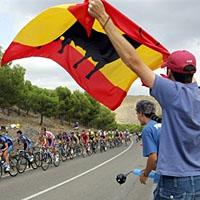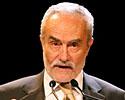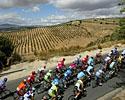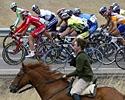News Feature, January 28, 2008
Did the Vuelta's date change hurt the race?
In 1995, the Vuelta a España organizers and the UCI decided to change the dates for the Spanish race from April and May to the current August-September spot in order to attract a higher quality, more international field. France's Laurent Jalabert was the first to win the late summer edition, and for a time, the change brought the race higher prestige. But in recent years the quality of the race has been slipping. Opinions vary as to what is the cause and how it can be fixed. Cyclingnews' Hernan Alvarez reports.
 |
The dispute about whether to race the Vuelta in the spring or the summer is on the table of Spanish cycling, and there are many opinions. Some are in favor of things remaining as they are now with the Vuelta in September and others think of changing in back to April. Cyclingnews reached the race director, one rider and two journalists to find out what they think about this issue.
The Vuelta a España's current director Victor Cordero is of the side which favors the spring timing for the race. "I'm convinced that it's better in the spring," said Cordero. However, he explained, the reasons for moving the date in the mid 90's were valid. "Taking into account a global vision, maybe it's better for the rest of cycling to have a longer season, as it is now.
"The original objective of moving the Vuelta to September was that the teams would then have more than three to four months to perform, and could race from April to September. Previously [the season] was from April to the end of July with the Tour de France. For the Vuelta, the April-May dates were better, no doubt about it."
"The Vuelta in April couldn't attract the great international stars."-Chema Rodriguez explains that the spring edition of the Vuelta had its own problems. |
Veteran cycling journalist Chema Rodriguez also gave his opinion about this matter. Rodriguez is against bringing the Vuelta back to April. "I lived the controversy about the date changes intensely as a director of a specialized media [Spain's Meta 2Mil magazine]. In fact, from the very beginning I was one of the few journalists who was in favor of the change from April to September. And I remember that little by little, as years went by, most of the Spanish media were changing their minds and recognizing the improvements that the change made," said Rodriguez.
The main reason for the 1995 shift was the absence of the great names on the Spanish roads. "When the former owners of the race accepted the proposal of the then president of the UCI, Hein Verbruggen, they didn't do it in a capricious way," continued the journalist. "The Vuelta in April couldn't attract the great international stars. After winning his first Tour [de France] in 1991 Miguel Indurain never raced the Vuelta in April again. And the the man from Navarra wasn't the only one absent among the great stage race riders." A major factor for the race is the weather. "The climate was another factor to consider: Spain is much rawer in April than it is in September when there are still people enjoying their [summer] holidays," said Rodriguez.
 |
The Vuelta a Espaņa has had several tough years, and is weathering many factors which have hurt audiences and impacted the quality of the racing. Rodriguez considered that some people blame this decline exclusively to the shift in date. "I followed the decline of the Vuelta during the last years, and they match with the devastating effects of the ProTour. In this time I realized how some parts of the [Spanish] cycling try to blame this decay on the date change. And they do it when 13 editions have passed since that change. I have heard criticism of the current dates coming from young journalists who didn't know the Vuelta when it was in April-May. The ones who, inside the current organization, point to the date change as the reason for the problems that the Vuelta suffers currently do it to avoid assuming their own more recent errors," stated Rodriguez.
The journalist doesn't believe moving the race back to the spring would be a solution; on the contrary, he thinks it would weaken the race. "Today the Vuelta in April would have the same problems that it suffers currently with an extra one: the level of participation would be worse than the current one," he said. Rodriguez also thinks that the restrictions of the ProTour on team invitations has hurt the race by limiting the number of non-ProTour Spanish teams which could participate. "The old excuse that the Spanish teams used to come to the race [in April] with more enthusiasm doesn't count because recently the organization didn't allow some [Spanish] teams to race that used to do their very best. Besides, the current [elite] cycling has become globalized and to talk about Spanish teams, at least in the ProTour category, is a misnomer."
Rodriguez feels that the discussion is moot anyhow, because the Vuelta's date won't change as long as the relations between Vuelta organizer Unipublic and the UCI remain so distant. "I think this is a sterile debate because in order to recover the former dates [the organizers] would have to count on the consent - better said, the complicity - of the UCI. And I don't think the current relations are the best to reach this kind of agreement. In the case the UCI would be willing to make it, I would honestly distrust them," Rodriguez judged.
 |
Cordero knows the shift is unavailable, at least in the near future. Besides, the Vuelta director sees a global change in the international calendar. "Today there's no chance, especially considering the current confrontational situation between the international organizations and the three Grand Tours organizers. The day when this conflict starts being solved, without a doubt one of the points [of discussion] will be the calendar.
"The calendar that we have has incoherent points, to put it nicely, which is devastating for cycling - like having great races coincide, like the Giro d'Italia and Volta a Catalunya, or the Vuelta a Espaņa with the Tour of Germany and the Tour of Poland. Talking about the races that coincide with the Vuelta, I think there is a politically unacceptable decision that is troubling [the Spanish tour]. I think the discussion about the calendar is necessary to get out of the current contentious situation," said the director.
 |
ABC newspaper journalist Jose Carlos Carabias covered the Tour of Spain many times and has a steady position about the date. "My opinion is that the experiment didn't work out as it was expected to," told Carabias. "The Vuelta always had been [up to 1994] the first peak of great cycling. The spring came up and there was Vuelta. The big riders from the peloton were able to prepare themselves for the Tour, there was curiosity among the fans to see how the stars were, and there was excitement to discover new faces. Apart from other economic factors, the shift to September came up because of the scarce participation level among the foreign stars. After 12 years, things didn't improve."
Carabias thinks the Vuelta in September doesn't attract the stars. "When the Tour is over, the season is over for the great [riders]. Not a single Tour winner has come up to perform in the Vuelta on September. Therefore, it is a class B race for the fans, just for [Spanish] national consumers. Besides, the Vuelta has to compete [on Spain's TV screens] with the beginning of the soccer league, the Champions League and in the last few years with the Formula 1 season. So, the Vuelta always loses. It is necessary to bring the Vuelta back to the spring if the organizers want it to survive. [In the fall], they are conflicting with the Tour of Germany and future races in Russia and China."
 |
Finally, there's a rider opinion - the judgement from the one who really lives the race from the inside. LA-MSS team's Constantino Zaballa gave his point of view. "Since I began as a rider I knew the Vuelta in September. I think that the only problem that it can have is that the season can be very long with the ProTour calendar, and that people [riders] reach the race a bit exhausted.
"It's difficult to give an opinion about this, especially in my position [as a rider]. I think it can have good things and bad things in September. Many ProTour teams reach September very exhausted and many of them come to the race just to complete the list. If they give places to non-ProTour teams that would be more focused on the Vuelta even though it was on September, these teams would reach the Vuelta with more motivation," said Zaballa.
In case the Vuelta moves back to the spring, Zaballa thinks some things would be different. "If it was in April, it is clear that many ProTour teams would reach the race in a stronger way, with their people with fresh legs. But I also think that in Spain in April depending on which mountains [are used] it is more complicated that in that period of the year the weather is good. If the Vuelta is raced in April, in terms of climate, it would be much tougher than it is in September. In participation terms, it is difficult to say something, considering the split there is between those for and those against the ProTour. I don't know how the Vuelta participation would be in April", Zaballa concluded.
Photography
For a thumbnail gallery of these images, click here
Images by AFP Photo
- The Vuelta has had trouble attracting top talent in recent years.
- The beautiful landscapes of Spain
- Victor Cordero the director of the Vuelta.
- The Vuelta's move from April to September improved the weather, but didn't fix all of the race's problems
- The Vuelta is part of Spanish culture

